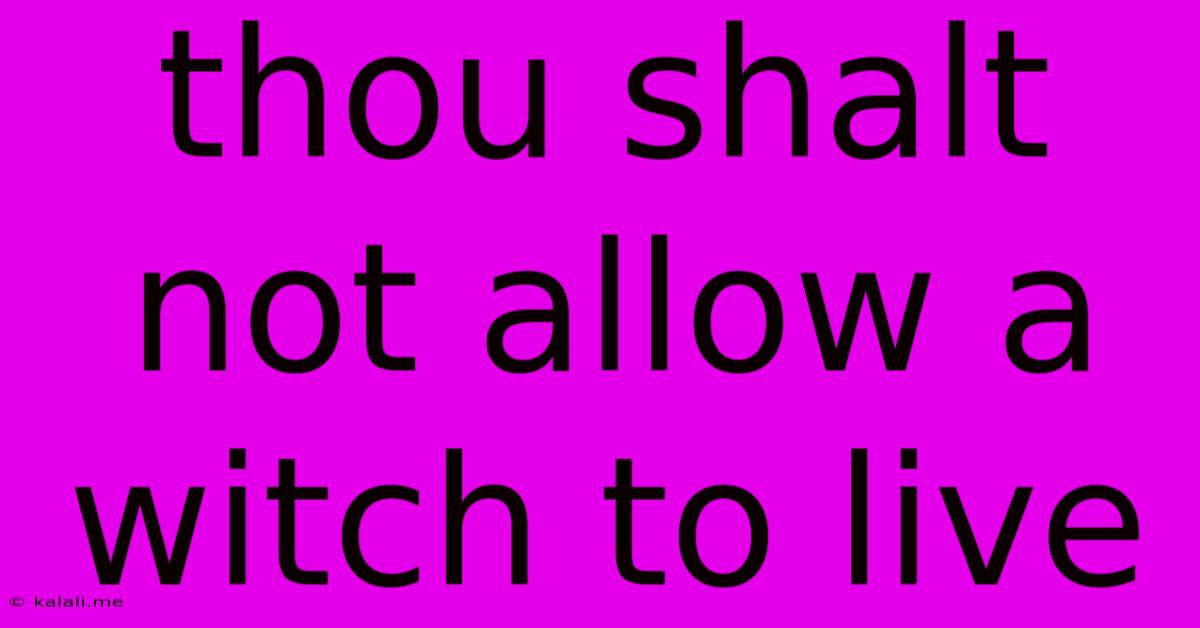Thou Shalt Not Allow A Witch To Live
Kalali
May 21, 2025 · 3 min read

Table of Contents
Thou Shalt Not Allow a Witch to Live: Deconstructing a Biblical Misunderstanding
The phrase "Thou shalt not allow a witch to live" (Exodus 22:18, KJV) is often cited as a justification for persecution and violence against those accused of witchcraft. However, understanding the historical and cultural context surrounding this verse reveals a far more nuanced picture than a simple call for execution. This article will explore the original meaning of the Hebrew text, the historical context of ancient Israelite society, and the dangers of misinterpreting this passage in modern times. Understanding the complexities surrounding this verse is crucial to combating harmful misconceptions and promoting a more nuanced understanding of the Bible.
The Ambiguity of the Hebrew Text:
The Hebrew word translated as "witch" in Exodus 22:18 is מְכַשֵּׁפָה (meḵāšēphāh), which is closely related to the verb כָּשָׁף (kāšaph), meaning "to practice magic" or "to enchant." This wasn't necessarily tied to the stereotypical image of a cackling woman brewing potions. Ancient Near Eastern cultures often associated magic with divination, attempting to uncover the future or influence events through supernatural means. This could encompass a wide range of practices, some benign and some potentially harmful.
Contextualizing Ancient Israelite Society:
Ancient Israelite society deeply feared the unknown and the power of seemingly supernatural forces. The prohibition against witchcraft was part of a broader campaign to establish a monotheistic faith, rejecting the polytheistic beliefs and practices common in neighboring cultures. The fear wasn't solely of malicious intent, but also of the perceived threat to Yahweh's sovereignty. Magic, in any form, was seen as a challenge to God's authority and a potential avenue for aligning oneself with other, often antagonistic, deities.
Beyond the Literal Interpretation:
It's crucial to avoid a literal interpretation of "Thou shalt not allow a witch to live" without considering the significant differences between ancient Israelite society and our own. The legal codes within the Old Testament should be interpreted within their historical and cultural context. Applying them directly to modern situations without considering the evolution of law, morality, and understanding of the supernatural is problematic and potentially harmful. Direct application risks legitimizing prejudice and violence against individuals based on unfounded accusations.
The Modern Implications:
Today, the phrase is often misused to justify discrimination and violence against individuals perceived as engaging in witchcraft or practicing any form of alternative spirituality. This interpretation ignores the complexities of the original text and the evolving understanding of magic, spirituality, and mental health. The danger lies in the potential to demonize and persecute vulnerable populations. Instead of focusing on punitive measures, a modern understanding should prioritize empathy, critical thinking, and the rejection of harmful stereotypes.
Understanding, Not Condemnation:
The verse in Exodus 22:18 should not be interpreted as a blanket condemnation of all forms of magic or alternative spirituality. Instead, it should be understood within its ancient historical context, acknowledging the cultural anxieties and beliefs of the time. By understanding the nuances of the text, we can move toward a more informed and compassionate perspective, rejecting violence and discrimination in favor of tolerance and understanding. The true lesson lies in understanding the underlying message of upholding a single, righteous path, not in the literal application of a specific, antiquated punishment.
Latest Posts
Latest Posts
-
Does Carpet Make A Room Warmer
May 21, 2025
-
Can I Use Euro Currency In Switzerland
May 21, 2025
-
Can You Plug A Refrigerator Into An Extension Cord
May 21, 2025
-
Whatsapp Background Changed By Itself Iphone
May 21, 2025
-
It Was Pleasure Talking To You
May 21, 2025
Related Post
Thank you for visiting our website which covers about Thou Shalt Not Allow A Witch To Live . We hope the information provided has been useful to you. Feel free to contact us if you have any questions or need further assistance. See you next time and don't miss to bookmark.